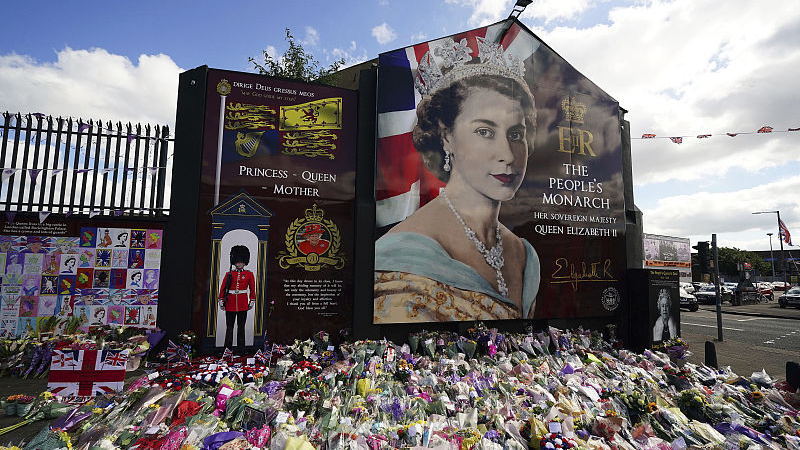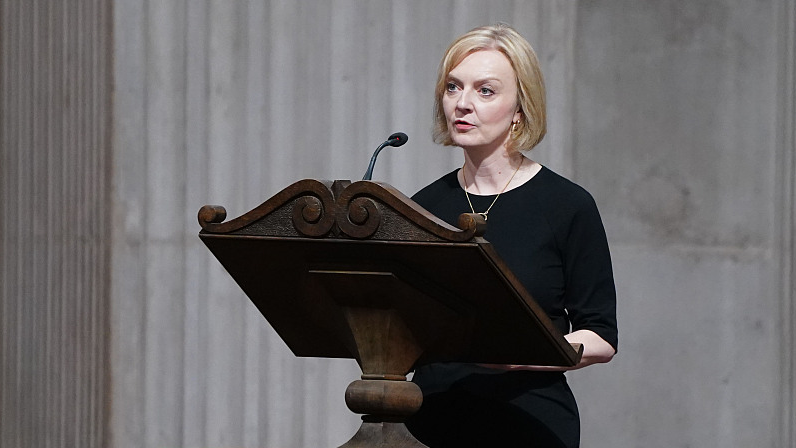
Flowers are laid on Belfast's Shankill Road following the death of Queen Elizabeth II, the UK, September 10, 2022. /CFP
Flowers are laid on Belfast's Shankill Road following the death of Queen Elizabeth II, the UK, September 10, 2022. /CFP
Editor's note: Stephen Ndegwa is a Nairobi-based communication expert, a lecturer-scholar at the United States International University-Africa, and an author and international affairs columnist. The article reflects the author's opinions and not necessarily the views of CGTN.
The death of Queen Elizabeth II of the United Kingdom (UK) at 96-year-old will continue to hit global news headlines for a couple of weeks. Her demise is not just a concern of the UK, but an event whose impact will reverberate across the Anglophone world in general, and the 56-member Commonwealth of Nations in particular. In the wake of her demise she has left behind a monarchy in crisis.
The Queen's final exit has brought into sharp focus the relevance of the British monarchy within the UK and in the geopolitical scheme of things as well. Coincidentally, the Queen's passing comes just after the UK had undergone another important transition for which she presided over – the exit of former Prime Minister Boris Johnson and his replacement with Liz Truss.
Before her election, Liz served as the Secretary of State for Foreign, Commonwealth and Development Affairs, an experience that will come in handy as Britain repositions itself after Brexit.
The symbolic ceremony between Queen Elizabeth and Truss on September 6 in Scotland giving the latter the go ahead to form a new government as the new premier was also symbolic of the need for a transition from an antiquated system to a new era in the monarchy. But experts observe that the enthronement of King Charles III is not expected to usher in fundamental changes to the monarchy.
The Royal family is in a crisis of identity. One of the symptoms of this malaise is the permanent stepping down of Prince Harry and his wife Meghan Markle as working royals in February 2021, and their relocation to Canada. To the Royals, Harry's defiance was the height of betrayal.
Now, if the poor showing of the 2022 Commonwealth Heads of Government Meeting (CHOGM) in June in Kigali, Rwanda is a sign of things to come, the UK's global club is facing serious headwinds. In its heydays from the 18th to the 20th centuries, Britain was revered as "the empire on which the sun never sets" to signify its vastness.
It is estimated that Britain controlled 25 percent of the earth landmass, which meant that there was always daylight in one of its territories. But all these territories have become independent states. Moreover, priorities for the Commonwealth countries, majority of which are developing, are now markedly different from the purported post-colonial camaraderie.

Prime Minister Liz Truss speaks at St Paul's Cathedral, following the passing of Britain's Queen Elizabeth II, London, the UK, September 9, 2022. /CFP
Prime Minister Liz Truss speaks at St Paul's Cathedral, following the passing of Britain's Queen Elizabeth II, London, the UK, September 9, 2022. /CFP
The death of Queen Elizabeth has also exposed the resentments that still exist in many of the UK's former colonies, particularly in Africa. Many Africans feel that the British should pay reparations for the atrocities perpetrated by the former colonialists on the indigenous populations.
The Queen was perceived as an architect of colonialism and not an innocent bystander, while her death is seen as an opportunity to hold the mirror up to both her legacy and that of the former empire.
There is no longer the desire to pursue the affirmation of the Commonwealth's common values and common strategy in the implementation of policies. Furthermore, commitments made at the CHOGM are becoming increasingly irrelevant with new geopolitical realities. Many Commonwealth member countries are playing ball with new partners with whom they share common aspirations.
The dynamics of multilateral relations has changed fundamentally, making groupings like the Commonwealth untenable in the current fluid dispensation in international relations. Moreover, regional bodies that these Commonwealth countries belong to have come of age and are filling various development gaps that the UK could have been addressing. But the UK must admit that it now lacks the capacity to lead its former colonies.
The Commonwealth has baggage that many of its member countries would like to forget. It reminds them of a dark past when the British colonialists ran roughshod over their basic human rights and exploited their lands for a pittance.
Britain is no longer the superpower of yore, and the British monarchy has become a shadow of its former self. Its place has been taken over by the U.S. and European Union (EU) in the sense of lording it over other countries. It is instructive that the UK has been fighting for its survival as informed by Brexit – its spirited fight to withdraw from the EU.
This is the kind of historical baggage that Commonwealth members wish to forget about in order to make a clean break from the past and move on. With a vast amount of wealth that the country feels beholden to from its former colonies, the UK is hard pressed to let go, even as the Commonwealth's sell-by-date has already expired. But one thing is for sure though – things will never be the same again.
(If you want to contribute and have specific expertise, please contact us at opinions@cgtn.com. Follow @thouse_opinions on Twitter to discover the latest commentaries on CGTN Opinion Section.)

